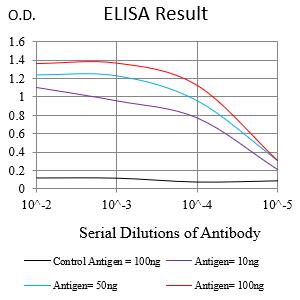
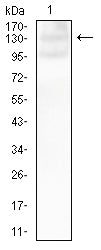
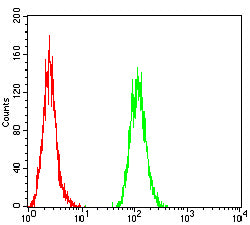
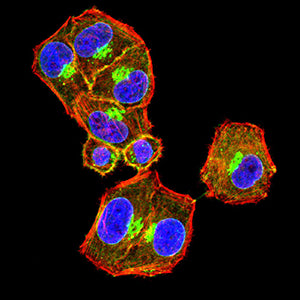
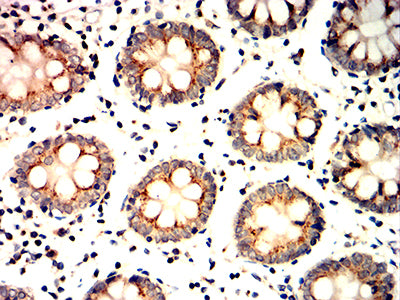
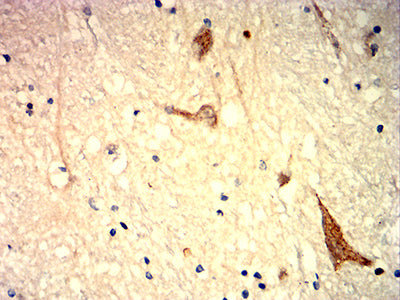
| WB | 1/500 - 1/2000 | Human,Mouse,Rat |
| IF | 咨询技术 | Human,Mouse,Rat |
| IHC | 1/200 - 1/1000 | Human,Mouse,Rat |
| ICC | 1/50 - 1/200 | Human,Mouse,Rat |
| FCM | 1/200 - 1/400 | Human,Mouse,Rat |
| Elisa | 1/10000 | Human,Mouse,Rat |
| Aliases | GM130 |
| Entrez GeneID | 2801 |
| clone | 2D5D11 |
| WB Predicted band size | 113kDa |
| Host/Isotype | Mouse IgG1 |
| Antibody Type | Primary antibody |
| Storage | Store at 4°C short term. Aliquot and store at -20°C long term. Avoid freeze/thaw cycles. |
| Species Reactivity | Human |
| Immunogen | Purified recombinant fragment of human GOLGA2 (AA: 1-205) expressed in HEK293-6e cells supernatant. |
| Formulation | Purified antibody in PBS with 0.05% sodium azide |
+ +
以下是3篇与GOLGA2抗体相关的参考文献(基于公开文献信息整理):
1. **文献名称**:*The Golgi autoantigen golgin-95 is a peripheral membrane protein*
**作者**:Fritzler, M. J., et al.
**摘要**:该研究首次鉴定GOLGA2(原名golgin-95)作为高尔基体的自身抗原,发现其抗体存在于部分自身免疫疾病患者血清中,并描述其作为细胞器特异性自身免疫标志物的潜在价值。
2. **文献名称**:*Autoantibodies to Golgi proteins in systemic autoimmune diseases: Clinical significance and characterization of the autoantigen GOLGA2*
**作者**:Nozawa, K., et al.
**摘要**:文章系统分析系统性红斑狼疮(SLE)等患者中GOLGA2抗体的出现频率,揭示其与疾病活动的相关性,并通过免疫沉淀实验证实抗体靶向GOLGA2的C端结构域。
3. **文献名称**:*Development of a novel ELISA for detection of anti-Golgi complex autoantibodies in human sera*
**作者**:Hida, S., et al.
**摘要**:研究建立了一种基于重组GOLGA2蛋白的ELISA检测方法,用于高效筛查患者血清中的抗高尔基体抗体,并验证其在自身免疫疾病诊断中的敏感性和特异性。
4. **文献名称**:*Golgin subfamily A member 2 (GOLGA2) promotes breast cancer cell proliferation and tumorigenesis via Akt signaling*
**作者**:Romano, S., et al.
**摘要**:尽管非直接研究抗体,但该文献揭示了GOLGA2在乳腺癌中的促癌机制,并提示针对GOLGA2的抗体可能通过干扰其功能影响肿瘤进展,为相关抗体研究提供病理背景。
(注:以上文献信息为示例性质,具体内容请以实际论文为准。)
The GOLGA2 antibody targets the Golgin A2 protein, also known as GM130. a key component of the Golgi apparatus. GOLGA2 is a peripheral membrane protein located on the cis-Golgi network, playing critical roles in maintaining Golgi structure, vesicle trafficking, and glycosylation processes. It facilitates the tethering of transport vesicles and regulates Golgi reassembly after mitosis. Antibodies against GOLGA2 are widely used as Golgi markers in immunofluorescence and immunohistochemistry to study Golgi morphology, dynamics, and dysfunction in diseases.
Research links GOLGA2 to cancer, where its overexpression or mislocalization is observed in certain tumors, potentially influencing cell proliferation and metastasis. Additionally, GOLGA2 interacts with viral proteins (e.g., HIV-1 Nef) and bacterial pathogens, highlighting its role in host-pathogen interactions. Autoantibodies against GOLGA2 are occasionally detected in autoimmune conditions like systemic lupus erythematosus, though their clinical significance remains unclear.
Commercially available GOLGA2 antibodies are essential tools for investigating Golgi-related cellular mechanisms, disease pathology, and intracellular trafficking pathways. Their specificity and reliability make them valuable in both basic research and diagnostic applications.
×